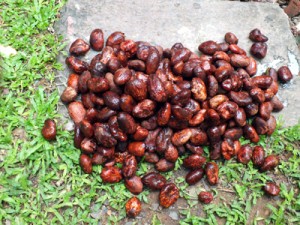Substitute for cocoa butter which could be grown in Sri Lanka
As Sri Lanka’s tea industry heads into one crisis or another, the current discussion is on how to make the industry more productive and sustainable and ensure a fair return on investments.
Along with this have emerged some suggestions, among other views, on replanting or replacing unviable tea bush with more economically-viable commercial crops.
Tea plantations are normally inter-spaced with huge trees planted to give shade for the tea bush. A Sri Lankan agriculturalist – Hemal De Silva living in Moratuwa – has with several other foreign agriculturalists/food scientists identified a remotely known tree – Pentadesma Butyracea, commonly known as ‘Butter Tree’ – for this purpose. Mr De Silva himself has been a planter for a long time managing estates and has been an enthusiast on alternate crop planting and food sciences.

Seeds from the “Butter Tree”
His arduous long drawn research and experiments with several other foreign food and agriculture experts have somewhat shown that the fruits of the Butter Tree could be used to turn out an alternative to ‘Cocoa-butter’ by mixing with other vegetable-fats. The oil/fat extracted from the seeds can be converted to biodiesel as a substitute for imported diesel and if commercialized could save a major portion of Sri Lanka’s foreign exchange. According to him it could create a good demand for global cosmetic, food and confectionery industries too which would generate high income; fight against environmental pollution and also, if systematically grown, could alleviate poverty by encouraging the smallholders to grow these trees. He says this tree could be grown as a shade tree in tea plantations and possibly the uneconomical, commercial plantations could be replaced with Butter Trees, including tea and rubber.
In this process, Mr De Silva has worked with Prof V K S Shukla, Food Sciences and Nutrition, International Food Science Centre, Denmark. In 1987 when Prof Shukla was in Sri Lanka on a business tour, he was taken to the Peradeniya Botanical Gardens, where the Pentadesma Butyracea of tropical West African origin, which was planted by the British some 115 years ago and bearing fruit, drew his attention.
He said that it is not known that this tree is grown on commercial scale, anywhere in the world and also very little information on its availability elsewhere. Another food consultant, Dr Ralph Timms from the UK has indicated to him that the fat extracted from these seeds is better than other alternatives.
After 20 years, in 2007 Mr De Silva was curious to procure more information and commenced writing to many research institutes, interested individuals and companies and then learnt its multifaceted potentials. Unfortunately, there is no tested data, he says. If large quantities of this fat could be extracted, he has found that there are British companies willing to purchase it. He said that the original cocoa butter that is made out of cocoa seeds and used to make chocolates is very expensive. Some chocolate manufacturers tend to use cheap alternatives turned out from a combination of vegetable fats and in the same way Pentadesma seed extracts could be mixed with other vegetable fats extracted and used as an alternative to cocoa butter.
These trees could ideally be grown in the wet zone and would be cost effective as the tree tends to give a high yield. It also would not need much or any care once it is fully grown. Growing Pentadesma would be less costly, less than even growing coconut, Mr De Silva asserted.
It would take five to six years for the tree to be fully grown and then harvesting would be once a year. Around 400 trees could be planted in a hectare and 40 kgs of fat could be extracted per hectare, and by 10 years the extraction would increase to 140 kgs.
He said that already a test crop is on where about five acres have been planted in the Pelmadulla area and is now 28 months old. The species has the potential to create a cleaner environment and alleviate poverty. Mr De Silva says it would reduce the CO2 in the environment.
Follow @timesonlinelk
comments powered by Disqus



























